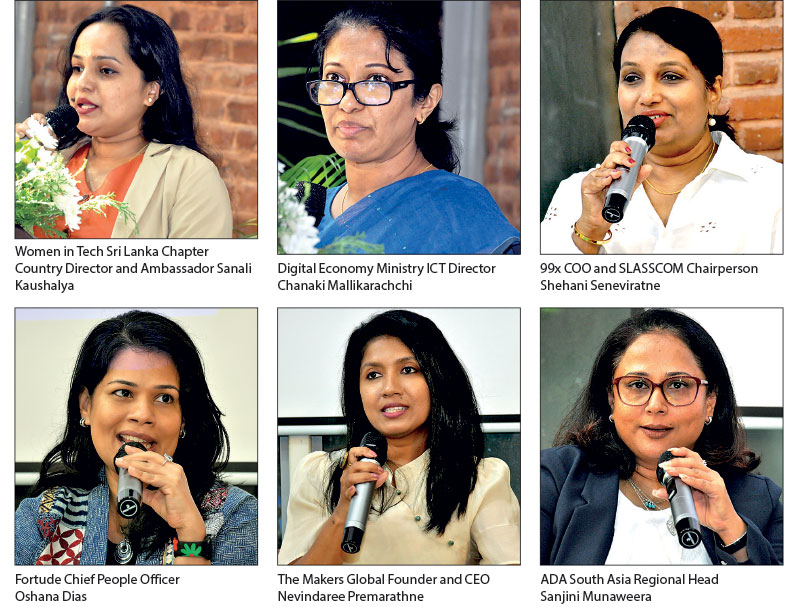Saturday Feb 21, 2026
Saturday Feb 21, 2026
Thursday, 6 November 2025 05:26 - - {{hitsCtrl.values.hits}}

By Divya Thotawatte
With artificial intelligence (AI) redefining industries worldwide, a group of Sri Lankan women professionals recently came together calling for greater inclusion and leadership opportunities for women in the country’s tech space.
This discussion took place at the Women in Tech – Chapter Reignite, which brought together leaders from Government, industry, and start-ups to discuss how Sri Lanka could build a more inclusive digital economy. It was organised by the Sri Lankan Chapter of Women in Tech, a global non-profit dedicated to empowering women in Science, Technology, Engineering, and mathematics (STEM).
The event marked the chapter’s relaunch and focused on digital readiness, competitiveness, and preparing women to lead in the AI-driven future. Among those present were Digital Economy Ministry ICT Director Chanaki Mallikarachchi, Women in Tech Sri Lanka Chapter Country Director and Ambassador Sanali Kaushalya, and other industry leaders.
Kaushalya highlighted that the chapter relaunch was meant to “reignite our passion, our purpose and our power to create lasting impact in the Sri Lanka tech ecosystem.
She noted that although women made up a significant share of graduates in science and engineering, the numbers of women pursuing IT and technology was far less. The gap represented lost potential that could have driven innovation, inclusion, and the digital economy,” she said.
“This is not just about technology, it is about creating an ecosystem where women are not just participants but leaders, innovators and decision makers. Our mission is to make sure their contributions are recognised and celebrated and multiplied,” she said.
The panel discussion was a wide-ranging conversation on what it means for Sri Lanka to enter the age of AI and who got to shape it. It featured 99x COO and SLASSCOM Chairperson Shehani Seneviratne, The Makers Global Founder and CEO Nevindaree Premarathne, Fortude Chief People Officer Oshana Dias, and ADA South Asia Regional Head Sanjini Munaweera, moderated by Loons Lab Founder and CEO Pulani Ranasinghe.
“AI is something that everyone needs to embrace, whether it’s at the elementary level or whether in business… you need to innovate to stay relevant. I also strongly believe in inclusion, that no one should be left behind in this journey of AI and innovation,” said Seneviratne.
Highlighting how digital transformation in Sri Lanka was gathering momentum, she commented on the Government’s digital economy roadmap which aims to grow from $ 3 billion to $ 12 billion by 2030. Seneviratne said that once the digital public infrastructure was in place, it was up to the private sector to build on it.
“Everyone’s contribution is required. We should also look at how to position Sri Lanka uniquely in the AI space… timing is critical,” she noted.
Premarathne also spoke on the global race for technology and how Sri Lanka could position itself. She explained that there were certain industries and countries fighting over AI infrastructure, stressing that it was crucial that Sri Lanka strategises suitably. She added that Sri Lanka’s strategy “as a country, as a nation” remained unclear and must move from discussion to implementation.
She highlighted that this global moment was also significant for women, saying that while now machines could handle the heavy analytical and repetitive tasks, they still could not replicate human ambition or creativity. She added that being human therefore remained central to this era, where women could take on roles as innovators, operators, and leaders.
“If you don’t contribute what you believe, what you’re thinking and your perceptions, how can you expect AI solutions to work for you? Your voice has to be there.” Where AI makes decisions based on what it is fed, AI was a space of inclusivity where women could find equal opportunity, Premarathne said.
With 12 years of experience in tech, Dias had seen progress within the industry, but there was “still a long way to go.” She explained that while both men and women needed to be part of the conversation, a stronger pipeline of women entering and staying in tech was essential. Additionally, open discussions were also important to understand why women dropped out of tech, Dias said.
“Events and organisations like this provide that networking opportunity. But we also need to ensure that the different voices are heard and we need to do more because Colombo is just one part of Sri Lanka,” she said, urging that the discussion and empowerment needed to move beyond Colombo.
When focusing on inclusion, localisation was also important, said Munaweera. She explained that many AI tools and datasets were heavily influenced by other countries, making them less relevant for creative and marketing industries in Sri Lanka.
“We need to bring our culture and heritage out into the open. We need to use these tools to their full potential, but we don’t have enough data sets. That should be one of the very first priorities,” she advised.
The panel emphasised that in improving inclusivity, women must actively engage with AI, continuously self-learn, and seize equal opportunity to bridge the gender gap in tech, noting that it would elevate their professional roles. The speakers added that women needed confidence, preparation, and mindset to match technical spaces dominated by men, using AI as a tool for empowerment, creativity, and leadership rather than fear or hesitation.
Pix by Lasantha Kumara